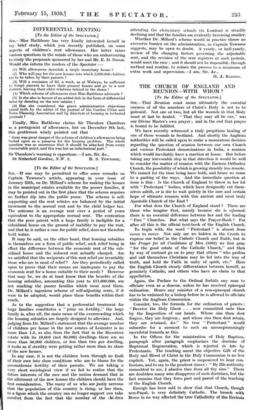[To the Editor of the SPECTATOR.]
Sza,—If one may be permitted to offer some remarks on Captain Townroe's article, appearing in your issue of January 25th, on Dr. Millard's scheme for making the houses in the municipal estates available for the poorer families, it may be pointed out in the first place that the scheme requires no further dip into the public purse. The scheme is self- supporting and the rent rebates are balanced by the initial increment to the normal rent and by the child lodger tax. The outcome is an average rent over a period of years equivalent to the appropriate normal rent. The contention that the poor parent with a large family is ineligible for a subsidized house on the ground of inability to pay the rent, and that he is rather a case for public relief, does not therefore hold water.
It may be said, on the other hand, that housing subsidies in themselves are a form of public relief, such relief being in effect the difference between the economic rent of the sub- sidized house and the reduced rent actually charged. Are we satisfied that the recipients of this rent relief are invariably those who are in need of relief ? Are they periodically called upon to prove that their means are inadequate to pay the economic rent for a house suitable to their needs ? However that may be, we do at least know that the benefits of .the housing subsidies, amounting this year to £11,000,000, are not reaching the poorer families which most need them. Dr. Millard's ingenious scheme of self-adjusting rents, if it were to be adopted, would place these benefits within their reach.
As to the suggestion that a preferential treatment for large families constitutes a " prize on fertility," the large family is, after all, the main cause of the overcrowding which the housing subsidies are largely designed to alleviate. And, judging from Dr. Millard's statement that the average number of children per house in the new estates of Leicester is no more than 1.5, as also from the fact that in the Becontree estate with its 18,000 (not 80,000) dwellings there are no more than 30,000 children, or less than two per dwelling, it looks as if sterility were getting rather more than its share of the new houses.
In any case, it is not the children born through no fault of their own into slum conditions who are to blame for the inconsiderate fertility of their parents. We are taking a very short sociological view if we fail to realize that the future interests of the •race and the nation demand that in the allotment of the new houses the children should have the first consideration. The many of us who are. justly nervous that the population of this country is rising, or has risen, to a figure which the country can no longer support can take comfort from the fact that the number of the chLdren attending the elementary schools (in London) is steadily declining and that the families are evidently becoming smaller.
• Whether Dr. Millard's scheme would in practice throw an excessive burden on the administration, as Captain Townroe suggests, may be open to doubt. A yearly, or half-yearly, review of the changing factors governing the adjustable rent, and the revision of the rent registers at such periods, would meet the case ; and it should not be impossible, through method and routine, to reduce the process to a minimum of extra work and supervision.—I am, Sir, &c., •
H. .1. BARTON.










































 Previous page
Previous page